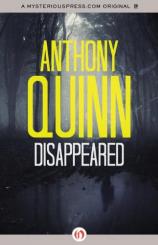Disappeared
Review
Disappeared
It is a truism that some of the world’s best storytellers hail from Ireland. Yet another exhibit offered in support of that statement is DISAPPEARED by Anthony Quinn. For a debut novel, Quinn’s narrative is remarkably sure-footed from beginning to end. This is a quietly engaging work that intermittently peeks suddenly and violently into the dark corners of the human psyche.
"Quinn has crafted a smart and complex mystery that assumes the reader is possessed of a higher than average knowledge and memory of the Troubles, but rewards such with a memorable account of the effects of prior sins upon current events."
The book introduces Celcius Daly (I love the name), a troubled Belfast, Northern Ireland police inspector who, in his own words, is laden with flawed judgment and misplaced loyalties. The tumultuous era and struggle in Northern Ireland during the latter part of the 20th century, known as “the Troubles,” may have ended, but its aftereffects still ripple throughout Belfast as the novel begins. It was William Faulkner who in REQUIEM FOR A NUN so famously wrote, “The past is never dead. It’s not even past.”
So it is that DISAPPEARED opens with two events in the present that are connected to a third, removed from the present but never truly departed. The first is the sudden disappearance of David Hughes, a retired Special Branch agent who is afflicted with early-stage dementia. It is initially believed that Hughes’ disappearance is due to nothing more nefarious than his wandering off in a confused state; it appears, though, that his intermittently reliable memory may have given rise to circumstances far more sinister. Hughes’ absence is marked by the subsequent discovery of the body of Joseph Grimes, a former spy for the British within the ranks of the IRA. There was a dark connection between Grimes and Hughes, one related to Oliver Jordan, who went missing at the hands of the IRA some years previously when it was believed that Jordan had betrayed the organization.
Daly is left with a limp handful of clues and conflicting suspects in his investigation of Hughes’ murder. The most confounding is his discovery that Hughes’ obituary was placed with the local newspaper the day before his death, and was in fact placed by Hughes himself. Further, the tribute contains what may be a cryptic clue as to the identity of his murderer. Complicating matters for Daly is the presence of Dermot Jordan, who never knew his father and now seeks not only Oliver’s body but also vengeance against those who murdered him. At the same time, unknown to Daly, there is a cold and deadly assassin who stalks the outskirts of Belfast. But at whose behest is he hunting his targets? And why?
Quinn has crafted a smart and complex mystery that assumes the reader is possessed of a higher than average knowledge and memory of the Troubles, but rewards such with a memorable account of the effects of prior sins upon current events. My understanding is that Quinn is presently writing a sequel to DISAPPEARED, which no doubt will bring Daly into contact --- and conflict --- with Special Branch, with attendant difficulties occurring for reasons far beyond those of jurisdictional disputes. We’ll be waiting.
Reviewed by Joe Hartlaub on September 14, 2012




